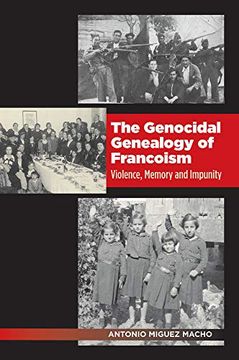The Genocidal Genealogy of Francoism: Violence, Memory and Impunity (The Canada Blanch (en Inglés)
Reseña del libro "The Genocidal Genealogy of Francoism: Violence, Memory and Impunity (The Canada Blanch (en Inglés)"
The Francoist command in the Spanish Civil War carried out a programme of mass violence from the start of the conflict. Through a combination of death squads and the use of military trials, around 150,000 Spaniards met their deaths. Others perished in concentration camps and prisons. The terror took other forms, such as mass rape, extortion, "appropriation" of children, and forced exile. The planned nature of this violence meant that the Francoists decided when the violence would begin, the way it would be carried out, and when it would come to an end. This is the primary reason why the judicial concept of genocidal practice, alongside the use of comparative history, can furnish insights. The July 1936 uprising was not only aimed at ending the Republican regime, but had ideological goals: preventing the supposed Bolshevik Revolution, defending the 'unity of Spain,' and reversing centre-left social and cultural reforms. An over-arching objective was the elimination of a social group identified as 'an enemy of Spain'-a group defined as not Catholic, not Spanish, and not traditional. With their access to state resources, their monopoly of force in some territories, and their subsequent victory, the coup's practice of genocide could be realised in the whole Spanish territory, permitting the hegemonic nature of the denialist discourse surrounding these crimes. Public debate over Francosim brings with it substantive disagreements. The book engages with the root causes of these disagreements. Violence and the memory of violence are viewed as part of a single phenomenon that has continued to the present, a process that is located within a comparative framework that analyzes the Spanish case beyond the debate between Francoism and anti-Francoism. The author explains the political and judicial proceedings in recent Spanish history with regard to its violent past and the implications for international justice initiatives. This book is published in association with the Canada Blanch Centre for Contemporary Spanish Studies, LSE. [Subject: Spanish Civil War, History, Military Studies]

